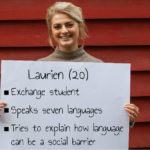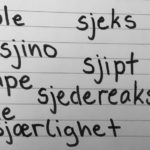We babble like the little brooks that run through the evergreen forests, a continuous stream of information. Until one day, we unknowingly confuse white spirit with water and our painting cannot be put together somehow. What once seemed so obvious and familiar, now looks crypted and estranged.
We are exposed to language from the moment we are growing in the dark warmth of our mother’s womb. Once we are born, however, it becomes clear we have barely scratched the surface of language perception. The muffled sounds that cooed us from the outside, now become clear and sharp for us to register. Our little brains are at this specific point in time able to learn any language in the world. But to learn a language in all its facets takes a lot of time and energy and in order to be able to communicate with our caregivers, we first need to make a selection of all the sounds that will be relevant for us to do so. For the purpose of this article, let’s position ourselves in the perspective of an English speaking native.
ABC or XYZ?
No one is born knowing a language in its entirety, but that does not imply that we can’t learn any language presented to us at the very beginning. It does not matter where you’re born, it matters which language your caregivers use to communicate with you. We humans are social creatures and communication may be one of our most important skills. It helps us to create a functioning society, and powerful empires. Communication provides us the possibility to discuss political issues, to express our emotions and opinions. All philosophers expressed themselves through a language to convey their perspectives on life or existence. Some even started to question language on its own possibly causing anyone who reads their works to start questioning the principles of reality altogether. It helps us carefully pondering the implications, and creating the foundations of the most intricate mathematical equations and axioma’s. But most important of all, it helps us to survive from the very moment we see the first light of day.
Many assume that learning a language might start by learning the alphabet, but some may know that by the time we actually reach the alphabet, we already have learned a great deal about our mother tongue. Newborns cry trying to win the mother’s empathy so that the newborn can be fed, changed (the diaper of course, not the baby), and cooed when needed. Toddlers start to utter single sounds, young children then attempt to connect these single sounds creating syllables and before they even realise it, their first word is formed.
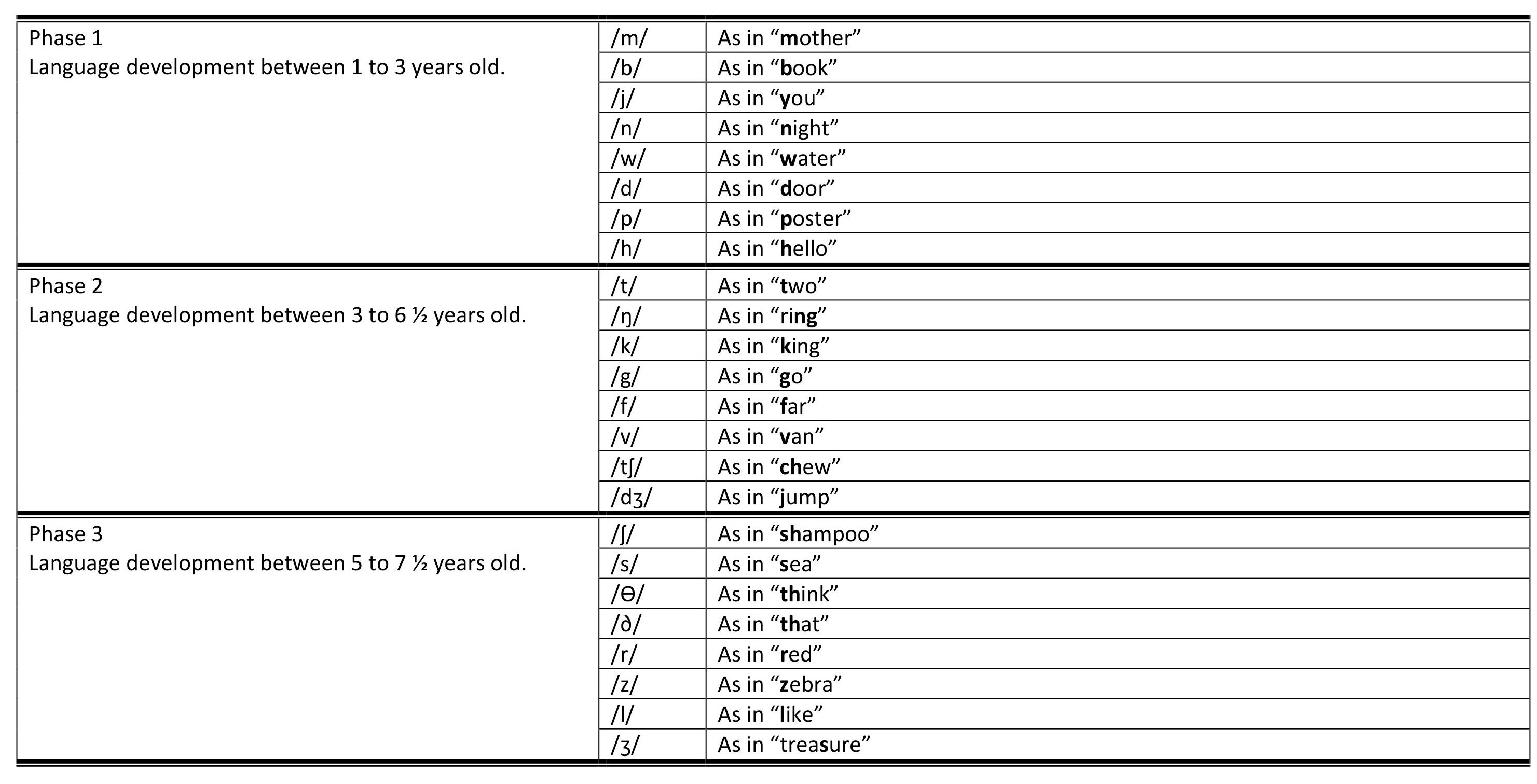
The word “mama” would be a great example. It is common for toddlers to start uttering a bilabial, a sound that is thus produced between the lips. It does not really matter whether it is /b/,/p/, /m/ that comes first, these are the sounds that are generally easiest to pronounce when acquiring a first language. Concerning the vowels, it could be stipulated that the [a] (as in ape) would be easiest for a child to pronounce, then afterwards the child will often counteract the /a/ sound with a sound that is opposite from that. Most likely it would be the [i] (as in thing) or the [u] (as in shoe). The [a] is an open velair vowel whereas the [i] is a closed palatal vowel. In normal “human” language this would imply that these vowels are pronounced in a very different manner and in a very different place in our oral cavity. A child makes this opposition because it is easier for them to learn two new sounds that differ rather than opting for two sounds that are pronounced similarly. Then later, the child will learn more complex sounds such as [ð] (as in this), [l] (as in life), and [θ] (as in bath). If everything goes according to plan the child will develop every sound that is required to fully understand and speak the language he/she is confronted with most.
But sometimes it can go wrong. Horribly wrong.
CTRL ALT DELETE
There is always a small percentage of people who will once find themselves in the unlucky situation in which they will experience language loss. Language loss can occur after a brain hemorrhage, a lesion, a seizure, or a neurological disease. There are two main areas in our left brain hemisphere which are specifically important for our understanding, processing, and production of language. When a person suffers language loss due to the aforementioned events, it could be coined under the term “aphasia”.
Aphasia
Imagine you suddenly seem to have woken up in a world where everyone speaks a language you don’t understand anymore. Your room is still familiar, and so are the people around you, but the words they say just don’t quite add up. This could be a representation of what aphasia could possibly feel like.
Aphasia however, has different characters as there is a type of language loss where the subject recognises the words mentally, still remembers their meaning, still knows how to use them when constructing sentences but no longer is able to physically utter or sign them, if they’re lucky, in the speed in which they used to. Broca’s area would be responsible for this type of aphasia. Another type of language loss can imply the continuing ability to physically produce language however without proper comprehension of the meaning of that which is uttered or signed. This type of aphasia would generally conform to the effects of the damage which is caused in Wernicke’s area. Broca’s aphasia is also known under the term ‘motor aphasia’ whereas Wernicke’s aphasia is known under ‘sensory aphasia’. Most frequently, when a person suffers language loss, it is rarely one or the other but often a combination of both, as these areas interact with each other.
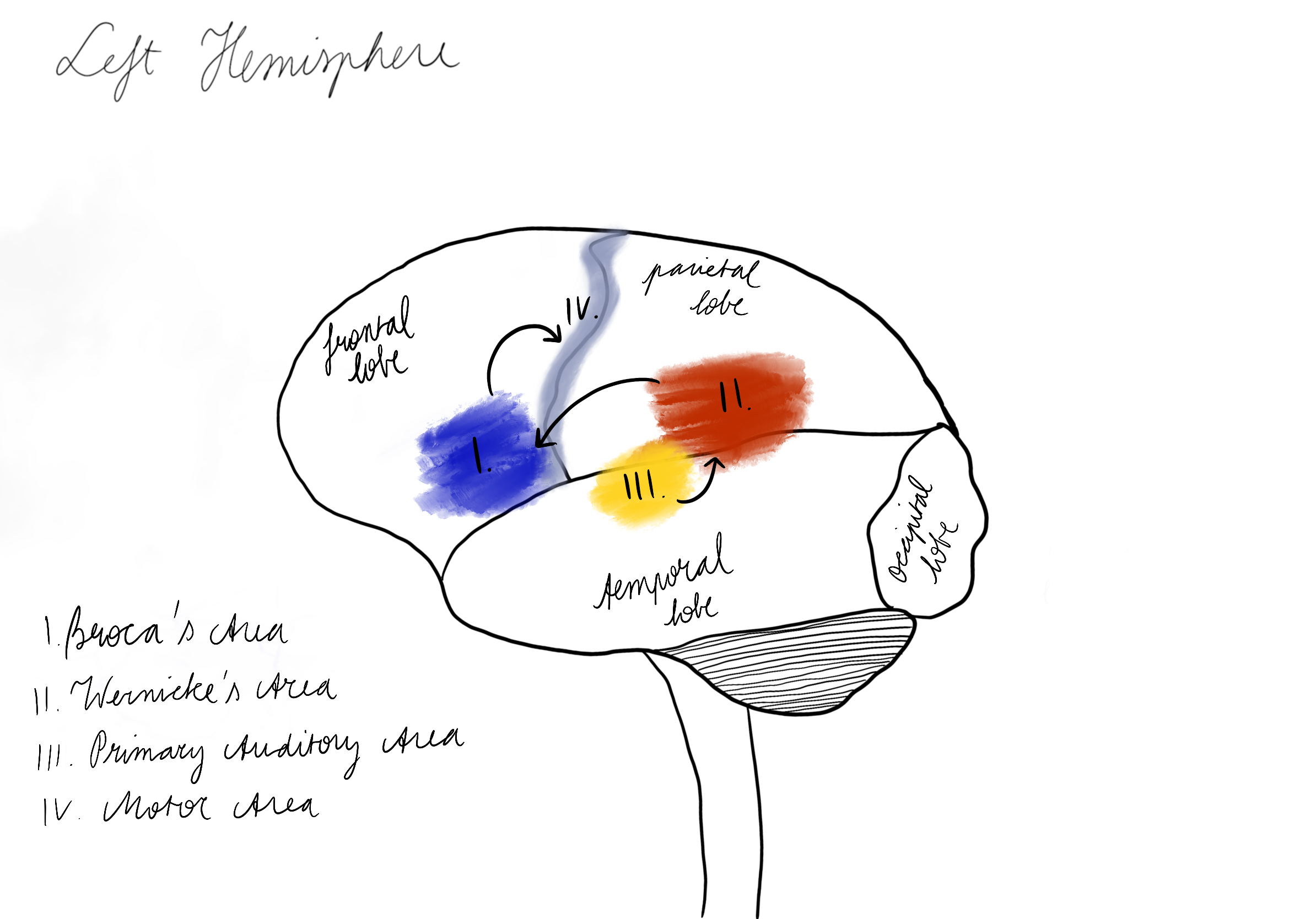
Broca
A remarkable aspect that tends to occur when a person suffers from Broca’s aphasia is the reversal of the sounds acquired in the first language regarding the physical ability to speak/sign. As mentioned before in the article, there is a certain order in which a child acquires its mother tongue. Certain sounds are easier to pronounce than others and it is for this reason Broca’s aphasia becomes interesting from a linguistic perspective. The patient often has a difficult time learning how to reproduce certain sounds.
Consonants such as [ð] (as in this), [l] (as in life), and the [θ] (as in bath) are particularly difficult to reacquire once lost. What happens next is that the patient will instead prefer consonants that are simplified versions of those difficult ones. The [ð], a voiced interdental fricative, will often be reduced to [z] a voiced alveolar fricative, or [v] a voiced labiodental fricative. Causing a word like “this” to sound like “zis” /zɪs/ or ”vis” /vɪs/.
A similar process happens with [l] and [r], in this case the lateral and the rhotic liquid would be pronounced as [j] a palatal glide, or [w] a bilabial glide causing words like “life” or “right” to sound like “jife” /jaɪf/ or “wife” /waɪf/ (but not the person that would belong to the husband/wife) or “jight” /jaɪt/ or “wight” /waɪt/. This perhaps might ring a bell when thinking of how children sometimes have a hard time pronouncing a consonant such as [l] and [r].
Another clear example is the reason why native speakers of Mandarin or Kantonese have troubles pronouncing [r] as they do not have this sound in their register. Meaning that if they have to learn new sounds then these would be based on the sounds that are present in the language they know best, their mother tongue. As we learn our first language, we select only those sounds relevant for us to survive (to begin with), those sounds we train until our facial and oral muscles have gotten used to these. When aphasia occurs in Broca’s area the brain “forgets” how to use these muscles making it therefore extremely hard to relearn the pronunciation we had before.
So when suffering from Broca’s aphasia, it is likely to experience the inability to reproduce sounds one used to know. Imagine trying to learn a sound that does not exist in your own mother tongue, which is often the fundament for the projection of sounds in our second/third/X language, hence we all have an accent to a certain extent. It is for this reason that Broca’s aphasia must feel rather similar to a situation where someone is trying to pronounce a sound in another language that does not exist in one’s own native language. The muscles are not used to move in this new manner and it would take some time and practice to master this new sound, as the oral and facial muscles have to get used to this new movement required to produce the sound. When suffering from Broca’s aphasia, the brain has to reacquire the needed muscle memory to be able to produce sounds they used to know before.
Wernicke
When a person suffers from aphasia in Wernicke’s area, he or she does not necessarily suffer muscular damage. It could be the case of course, as Broca’s area and Wernicke’s area are often functionally intertwined but most frequently the person is still able to physically produce language to the same extent as he/she did before. What changes for the sufferer is that it will be significantly difficult for them to produce meaningful sentences with regards to content. In our daily life we unconsciously use two important linguistic axes, namely the syntagmatic axis and the paradigmatic axis (see fig.)
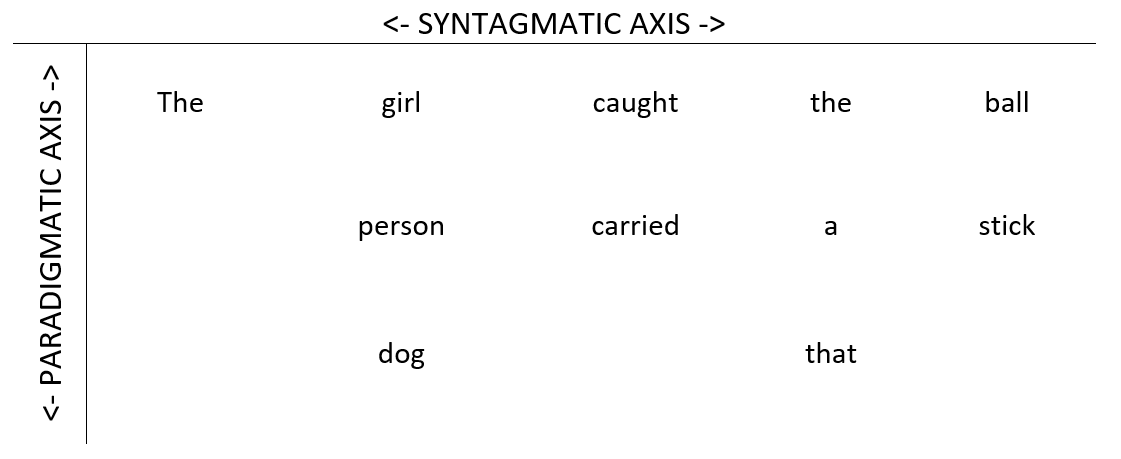
How we structure our sentences is regulated by the rules governed by the syntagmatic axes, so in other words the syntagmatic axis regulates how we linguistically perceive word order. Every word has a certain function, a place, and a relation to other words in a sentence. The subject often carries a noun, and so the speaker has to choose a noun that would fit the subject position with regards to the meaning the speaker wants to convey. The process of selecting a fitting noun/verb/adverbial… relates to the function of the paradigmatic axis. A person suffering from Wernicke’s aphasia would thus no longer be able to convey meaningful utterances. There is a lack of comprehension concerning the meaning of words causing the creation of meaning in a sentence to be a rather arduous task to perform. The sentences would seem incoherent and the relations between the words would appear irrelevant. Also note that the person would not only have a speaking impairment but also a writing/reading impairment as they cannot process language anymore compared to how they used to.
A Roadtrip Home
It is hard to understand or recognise the language you’ve always known once the brain has sent its linguistic functions abroad to another country. A country where your friends and family still live but where they have altered their language to such a great extent that it is has become impossible for you to process or produce this language. This “country” is luckily not an end destination for those who have suffered aphasia. Some can relearn all abilities making them able to go on with their lives as if nothing ever obstructed them and their language. Some are less fortunate and still struggle with those hard sounds or still struggle trying to find meaning behind these words that used to be so self-evident to understand. In the most severe cases some might never fully recover. Nevertheless, keep in mind that there is always hope. Our brain is so incredibly agile and can mend itself in ways that would perhaps baffle the most intelligent neuroscientist. We are able to form new connections in parts of the brain which have not experienced any damage, and that is only one of the remarkable features our brain can stupify us with.
PS Should you want to hear more about this topic, then I have good news for you! Ordskifte has released an episode named Psykolingvistikk og intervju med Karsten Specht, which covers some of the neurological aspects related to language mentioned in this article. We interviewed a neuroscientist, Karsten Specht, who explained us the relation between a neurological disease such as parkinson and language loss.
Siste podcaster
-
Tal- og skriftspråk
Tema for ukens sending er tal- og skriftspråk! Det blir ordskifte rundt om det finnes et standardtalemål i Norge eller ikke. Julia tar med oss hjem til Sverige der diskusjonen rundt et standardtalemål ikke er så vanskelig som den er her i Norge, eller er den virkelig det? Vi ser på en skriftform der talemålet ofte tar mer plass en i andre type sammenheng - nemlig språk på sociale medier. God lytt! I studio: Julia Zsiga, Øystein Sandve og Vilde Galtung Ordskifte er programmet for deg som har en mening om hva som er riktig og hva som er galt å si. Vi tar for oss språklige finurligheter og grunnen til at du snakker akkurat slik som du gjør. Hvis du føler at det du trenger i radiouniverset ditt er et språkprogram med et friskt pust, er Ordskifte programmet for deg! -
Ordskifte - Et kjært gjensyn
Denne uken har vi med oss ikke en, ikke to men tre gamle medlemmer av Ordskifte. De er her for å fortelle oss om masterprosjektene deres, eller er det deres masterprosjekt..? Maria Gunnarsdotter Svedal forteller oss om hvordan engelsk blir brukt i norske podcaster, Ole Raade om frem- og etterstillt possesiv og Berit Helle Jonsbråten om fonemene e og æ på Jæren. Det blir en vittig reise down memory lane. God Lytt! I studio: Tiril Absalonsen og Julia Zsiga Ordskifte er programmet for deg som har en mening om hva som er rett og hva som er galt å si. Vi tar for oss språklige finurligheter og grunnen til at du snakker som du gjør. Hvis du føler det du trenger i radiouniverset ditt er et språkprogram med et friskt pust, er Ordskifte programmet for deg. -
Godt og blandet
I ukens episode lærer vi om russiske dialekter, diskuterer utrydningstruede ord og snakker om fenomenet mango. Vi har også et språklig dilemma på lur der hjernecellene får kjørt seg. God lytt! I studio: Tiril Solheim Absalonsen, Øystein Sandve og Vilde Galtung. Ordskifte er programmet for deg som har en mening om hva som er rett og hva som er galt å si. Vi tar for oss språklige finurligheter og grunnen til at du snakker som du gjør. Hvis du føler det du trenger i radiouniverset ditt er et språkprogram med et friskt pust, er Ordskifte programmet for deg.
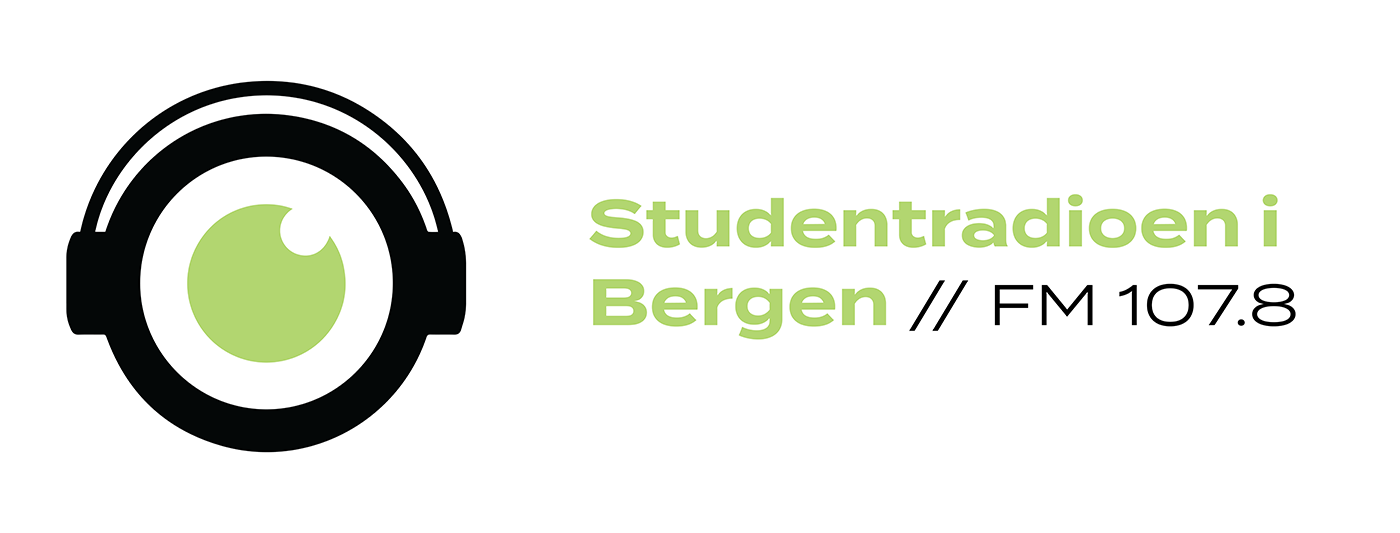
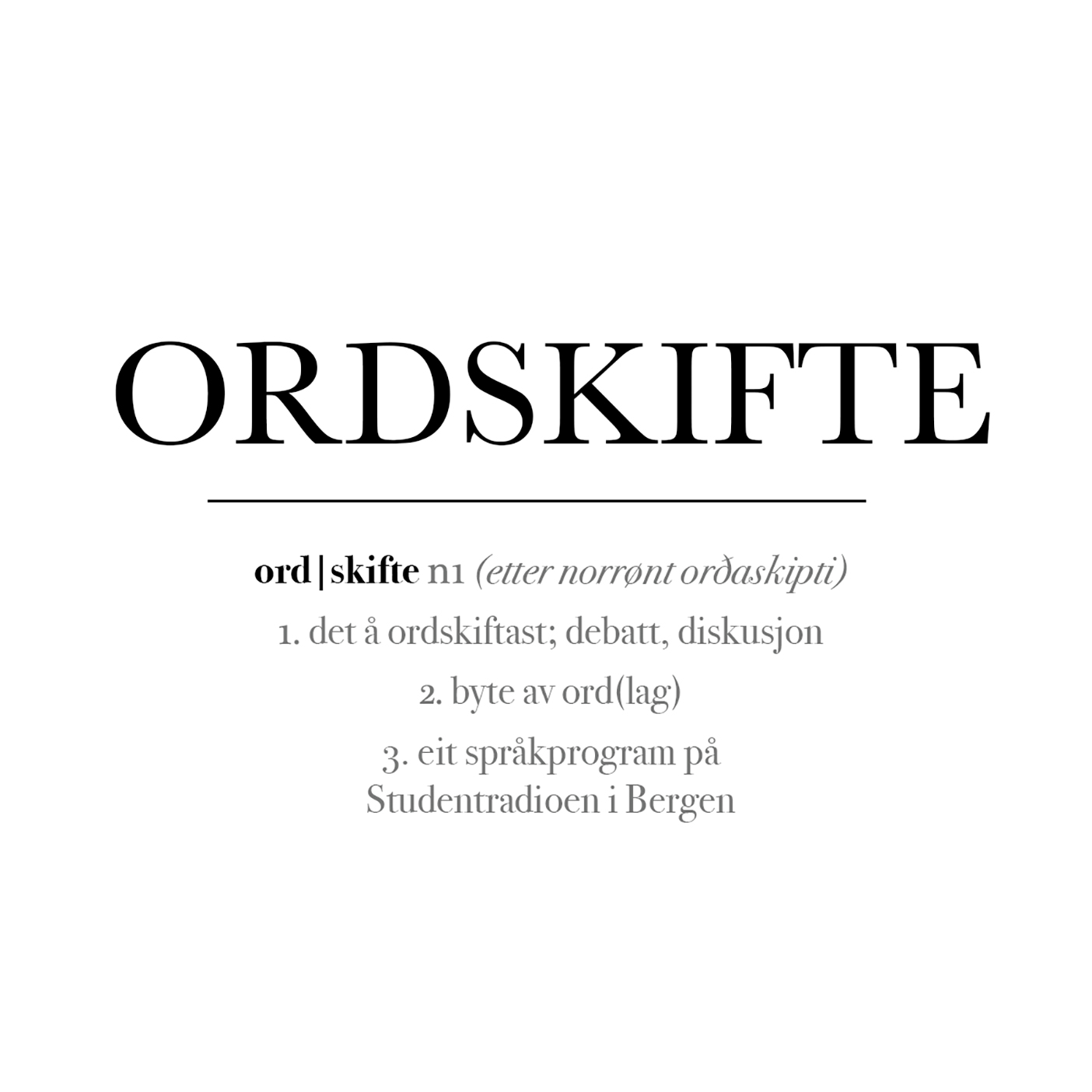
 Last ned episoden
Last ned episoden

